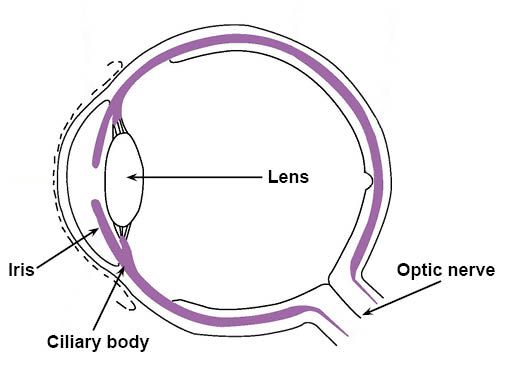Acute Anterior Uveitis (AAU)
Information for patients from Ophthalmology
This leaflet is not meant to replace the information discussed between you and your doctor, but can act as a starting point for such a discussion or as a useful reminder of the key points.
What is AAU?

AAU is an inflammatory condition affecting the iris (the front chamber of the eye and its tissues, such as the ciliary body).
It can be linked with other inflammatory or infectious conditions of the body, for example sarcoidosis or tuberculosis. But in most cases the cause is unknown.
What are the signs and symptoms?
Symptoms include an aching, painful red eye with a small pupil, blurred vision, and sensitivity to light.
What is the treatment?
It is important that this condition is treated in the Eye Casualty Department on Rotary Ward at William Harvey Hospital (WHH) Ashford, as AAU can be difficult to diagnose without certain equipment which is not usually available at your GP surgery. You will be transferred either from the Emergency Department at WHH or directed by your GP / optician to the Eye Casualty Department.
A doctor will ask you detailed questions about your medical history, and examine the front and back of both your eyes. Dilation drops to open up your pupils will be needed for this examination. This is likely to affect your vision for two to three hours, so it is important that you do not drive to the hospital yourself, as you will not be able to drive again until your vision has returned to normal.
The doctor will then decide whether you need any further investigations (such as blood tests and / or a chest x-ray). They will also prescribe you anti-inflammatory drops; please read the instructions carefully as to how to use these drops. Your doctor will discuss how often you need to use them at this appointment.
Depending on how bad your inflammation is, you may also be prescribed drops to keep the affected pupil dilated. This will help make your eye more comfortable.
Even if your eye starts to feel better, you should not suddenly stop using the drops unless you have been told to by your consultant, otherwise AAU may come back again.
Are there alternatives to anti-inflammatory drops?
Anti-inflammatory drops are the only way to treat this condition. However, the drops prescribed may vary from person to person.
How will the drops effect my eyesight?
The drops will dilate your pupil (make it bigger). This will cause blurring of your vision and difficulty in focusing. The drops may also increase your sensitivity to light but using these drops is an important part of your treatment for AAU. If your pupil is not dilated, your inflamed iris will stick to the lens which may lead to complications.
You may need intensive pupil dilating drops to make sure that your pupil is fully dilated before you go home.
Will the drops hurt?
There may be some short term stinging when the drops are first used, but this should pass quite quickly (within two or three minutes).
Can I drive home from my hospital appointment?
We advise you not to drive to your appointment as we may put drops in your eyes that will dilate your pupil, which will affect your vision. If necessary, please arrange for someone to bring you to your appointment and collect you afterwards.
We always examine both the affected and unaffected eye, as there are times when the inflammation is in both, however only one eye will have symptoms.
Are there any side effects to using the drops?
Long-term use of the drops can cause an increase in pressure in your eye. However long-term use is uncommon in this condition, and if you did need this you would be monitored in the Eye Clinic.
Sometimes the drops cause some blurring of your vision. If this happens you should not drive or operate machinery.
Some people will develop an allergy to the drops.
If your condition worsens or does not appear to be improving, you should contact the Eye Casualty Department.
Can I continue to wear contact lenses?
It is not advisable to wear contact lenses until the AAU has gone and you have been advised to do so.
Will the condition come back?
AAU is likely to occur again in most patients.
Should you have another attack of AAU, you must get early treatment at the Eye Casualty Department to prevent complications. The sooner treatment is started, the quicker the inflammation goes down. Please speak to your GP if symptoms come back.
What if I have any concerns when I get home?
If you have any queries concerning your condition or treatment, please speak to your GP.
Please remember
It is always important to tell us about any medical condition that you may have, or any medication that you are already taking, as this may affect the treatment that you are given.